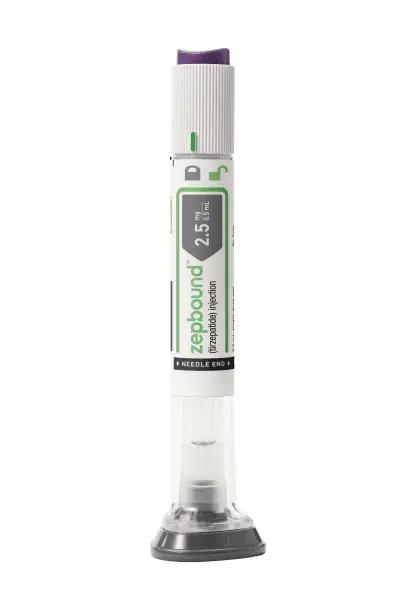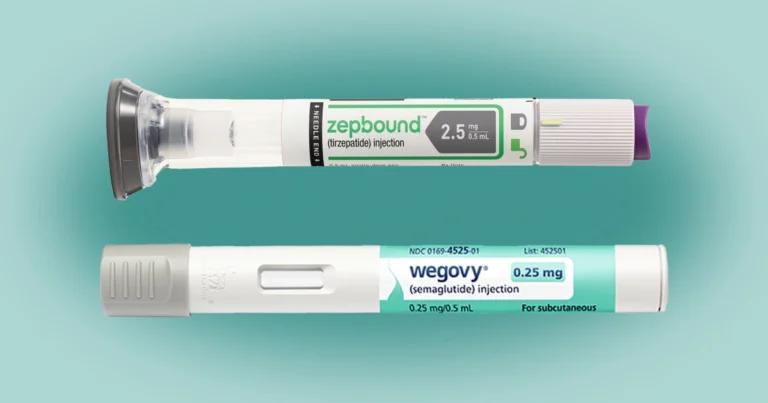In today’s healthcare landscape, effective weight management and diabetes control are central to improving quality of life. Zepbound and Ozempic, each targeting these issues respectively, offer patients new avenues for treatment. Zepbound, with its active ingredient tirzepatide, stands out in its class, while Ozempic, containing the widely used semaglutide, is also a key player in managing these health challenges.
Patients and healthcare providers have various options to consider, with Zepbound available in 5 mg, 10 mg, and 15 mg doses, and Ozempic in 0.25 mg, 0.5 mg, 1 mg, and 2 mg doses. This comparison aims to illuminate the similarities and distinctions between these medications, assisting decision-making for those seeking the most suitable treatment for their needs.
Understanding Zepbound
Zepbound, the brand name for tirzepatide, is a medication that has garnered FDA approval for its role in chronic weight management, specifically targeting adults struggling with obesity or overweight conditions, coupled with weight-related health issues. This drug is relatively new to the market, having received FDA (Food and Drug Administration) endorsement in November 2023, and is produced by pharmaceutical giant Eli Lilly and Company.
Key characteristics of Zepbound:
- Administration and dosage: Zepbound is designed for patient convenience, administered via a weekly injection that can be self-administered at home. The starting dose is typically 2.5mg, which can be gradually increased monthly to a maximum of 15mg to suit individual patient needs
- Mechanism of action: As a dual-agonist medication, Zepbound operates uniquely by activating two hormone receptors, GIP and GLP-1. This dual action not only aids in managing blood glucose levels but also contributes to a feeling of satiety, helping patients eat less and potentially lose weight
- Clinical efficacy: In clinical trials, Zepbound has demonstrated impressive weight loss outcomes. Non-diabetic patients using the highest dose experienced an average weight loss of 18%, and some individuals saw a reduction in body weight of up to 26% over 88 weeks. These results are notably higher than those associated with other medications like semaglutide, the active ingredient in Ozempic
Eligibility and expected outcomes:
- Patient eligibility: Zepbound is indicated for adults with a BMI (body mass index) of 30 kg/m^2 or higher (obesity) or a BMI of 27 kg/m^2 or higher (overweight) with at least one weight-related health condition such as hypertension, heart disease, or obstructive sleep apnea
- Weight loss potential: The drug has shown promise in achieving substantial weight loss, with some patients losing as much as one-fourth of their body weight, a significant milestone in the weight management field
Cost and side effects:
- Pricing: The cost of Zepbound is approximately $1,059.87 per fill, a figure that reflects the drug’s novel status and the research and development investment behind it
- Side effect profile: While Zepbound is generally well-tolerated, it can cause gastrointestinal issues such as diarrhea, constipation, nausea, and vomiting, among other side effects like fatigue, allergic reactions, and injection site reactions. It’s important to note that Zepbound may have fewer side effects compared to its counterparts, such as Ozempic or Wegovy
Zepbound represents a significant advancement in weight loss pharmacotherapy, particularly for those who have not achieved their weight management goals through diet and exercise alone. It stands out as a dual-agonist drug, a distinction that sets it apart from single-agonist drugs like Ozempic and Wegovy, and may offer enhanced efficacy in reducing body weight. However, patients need to consider the full scope of treatment, including the potential side effects and the financial investment required, as Zepbound is not typically covered by insurance plans.
Understanding Ozempic
Ozempic, manufactured by Novo Nordisk is a medication that has made significant strides in the management of type 2 diabetes and has also found its way into the weight management arena, albeit off-label. Below is an understanding of Ozempic, laying out its usage, effectiveness, and safety profile.
Usage and effectiveness:
- Type 2 diabetes management: Ozempic, with semaglutide as its active ingredient, is primarily FDA-approved for type 2 diabetes management. It aids in lowering blood sugar by increasing insulin production
- Weight loss: Although not officially approved for weight loss, Ozempic has been used off-label for this purpose due to its appetite-suppressing effects. Its generic version, semaglutide, is approved for weight management under the brand name Wegovy
- Cardiovascular benefits: Besides glycemic control, Ozempic has been shown to reduce the risk of major adverse cardiovascular events in adults with type 2 diabetes and established cardiovascular disease
Safety and eligibility:
- Contraindications: Ozempic is not suitable for individuals with type 1 diabetes, those under 18, pregnant or breastfeeding women, or those with a history of pancreatitis or diabetic retinopathy
- Side effects: Patients may experience common side effects such as gastrointestinal issues, and in rare cases, severe side effects like thyroid tumors, pancreatitis, and vision changes
- Insurance coverage: While Ozempic is typically covered by health insurance for diabetes, coverage for weight loss treatment is less common
Cost and availability:
- Pricing: The cost of Ozempic is approximately $1,350 per month, reflecting the complexity and research behind the medication
- Drug shortage: As of July 2023, there has been a reported shortage of Ozempic, impacting patients who depend on it for diabetes management
Ozempic’s role in treating type 2 diabetes and its off-label use for weight loss make it a versatile drug in the healthcare landscape. Its ability to mimic the hormone GLP-1 to induce satiety and slow digestion is a key factor in its effectiveness. However, patients and healthcare providers must weigh the benefits against the potential risks and consider individual health conditions when choosing Ozempic as a treatment option.
Comparative analysis of efficacy
- Efficacy in weight loss: Zepbound has shown a higher efficacy for weight loss when compared to Ozempic. This is a significant factor for patients whose primary health goal is weight management, especially those struggling with obesity or overweight conditions that have not responded to diet and exercise alone. Ozempic, while effective in its FDA-approved role for managing type 2 diabetes, is also used off-label for weight loss. However, the weight loss outcomes are not as substantial as those observed with Zepbound, which is designed specifically with weight loss as a primary objective.
- Cost considerations: The list price for Zepbound exceeds $1,000 per month, making it a more expensive option for patients seeking weight loss treatment. This higher cost reflects its novel approach and the significant research and development investment behind its market introduction. While Ozempic is used off-label for weight loss, it is primarily covered by insurance for diabetes management. Patients looking for a weight loss solution might need to consider the financial implications of choosing Zepbound over Ozempic due to the difference in insurance coverage and drug pricing.
- Market impact: Zepbound’s entry into the market may not only provide a more effective weight loss solution but may also influence the cost of multiple weight loss drugs, including Wegovy, a drug similar to Ozempic. The competition introduced by Zepbound could potentially drive down prices, making weight loss medications more accessible to a broader patient population.
Side effects and safety concerns
When considering Zepbound and Ozempic for weight management or diabetes control, it is crucial to be aware of the side effects and safety concerns associated with both medications. Here’s a breakdown of the potential side effects patients may encounter:
Gastrointestinal side effects
Zepbound and Ozempic: Both medications commonly cause gastrointestinal issues, which can include:
- Nausea and vomiting
- Diarrhea
- Decreased appetite
- Constipation
- Upper abdominal discomfort
- Abdominal pain
Serious side effects and safety concerns
- Thyroid and Pancreatic risks: Zepbound has been linked to thyroid C-cell tumors in animal studies, with the relevance to humans yet to be determined. Patients with a personal or family history of medullary thyroid cancer or MEN 2 should consult with their healthcare provider before starting treatment. Both medications carry a risk of pancreatitis.
- Additional risks with Zepbound: Possible symptoms of depression or suicidal thoughts, requiring close monitoring. Not recommended for use in individuals under 18, pregnant women, or those with a history of MTC or MEN 2.
- Severe side effects for both medications:
- Vision changes
- Kidney failure
- Gallbladder problems
- Allergic reactions
Cost and insurance considerations
- Financial impact: The cost of Zepbound is approximately $1,060 for a one-month supply, and insurance coverage is often not available for weight loss indications
- Ozempic and Wegovy: For comparison, Wegovy, the weight loss-approved version of Ozempic, costs around $1,350 per month
Long-term side effects and post-treatment considerations
- Unknown long-term side effects: The long-term side effects of Zepbound are not widely known, but there could be risks such as gallstones and an increased risk of medullary thyroid cancer
- Weight regain: Patients may experience weight regain after discontinuing tirzepatide, and lifestyle modifications are recommended to maintain weight loss
Patients should have a thorough discussion with their healthcare provider about these side effects and safety concerns, taking into account their personal health history and treatment goals. It’s also important to consider the financial implications, as the high cost of these medications may be a significant factor in the decision-making process.
Considerations before choosing a treatment
When patients and healthcare providers are faced with the decision of choosing between Zepbound and Ozempic, several critical considerations must be taken into account to ensure that the selected treatment aligns with the individual’s specific health needs and goals. Here are the key factors to consider:
- Primary health goals and effectiveness:If the primary goal is weight management, especially for patients with obesity or weight-related health conditions, Zepbound may be the preferred choice due to its higher efficacy in weight loss. For individuals focusing on type 2 diabetes management, Ozempic could be more suitable because of its FDA-approved status for this condition and its cardiovascular benefits.
- Side effects and dosing: Both medications have the potential for gastrointestinal side effects, and the choice may depend on the patient’s tolerance and response to these adverse effects.The dosing frequency and method of administration should also be considered, as Zepbound is administered weekly, which may be more convenient for some patients.
- Cost considerations: Zepbound’s list price is approximately $1,000, which may be a significant factor for patients, especially if not covered by insurance. Comparatively, patients might need to evaluate the long-term financial implications of choosing either medication, considering the direct costs and potential insurance coverage.
Patients must engage in a thorough consultation with their healthcare provider, discussing these factors in detail to make an informed decision that best suits their health situation and financial circumstances.
Conclusion
Through meticulous analysis, we’ve highlighted the critical differences and individual strengths of Zepbound and Ozempic, shedding light on their implications for weight management and diabetes control. While Zepbound emerges as a formidable option for those prioritizing weight reduction, its innovative approach to dual hormone receptor activation demands consideration of both cost and side effects. On the other hand, Ozempic stands out for its established efficacy in diabetes care and potential cardiovascular benefits, albeit with a unique set of considerations for off-label weight loss use.
In the quest for optimal health outcomes, patients must engage in informed discussions with their healthcare providers, weighing the merits of each treatment against personal health goals and potential risks. Taking that crucial step forward in your health journey is both empowering and essential, and for those considering Zepbound as part of their treatment plan, more information on this innovative medication is available here. As healthcare continues to evolve, understanding these options ensures that decisions are made with clarity, leading to improved quality of life and well-being.
Sources
- Ozempic® (semaglutide) injection for Type 2 Diabetes
- Zepbound (tirzepatide) Injection for Adults with Obesity or Excess Weight
Medical Disclaimer
NowPatient has taken all reasonable steps to ensure that all material is factually accurate, complete, and current. However, the knowledge and experience of a qualified healthcare professional should always be sought after instead of using the information on this page. Before taking any drug, you should always speak to your doctor or another qualified healthcare provider.
The information provided here about medications is subject to change and is not meant to include all uses, precautions, warnings, directions, drug interactions, allergic reactions, or negative effects. The absence of warnings or other information for a particular medication does not imply that the medication or medication combination is appropriate for all patients or for all possible purposes.
Related Articles
Is Zepbound as effective as Ozempic in promoting weight loss?
Zepbound has demonstrated effectiveness in a 72-week study, where it led to an average weight loss of 15-21%, which is slightly more than the 14.9% weight loss achieved by Ozempic in a 68-week study.
What is the efficacy of Zepbound in terms of weight loss?
Clinical trials from phase three have shown that tirzepatide, marketed as Mounjaro and Zepbound, resulted in an average weight loss of 20% or more after 72 weeks, which was a significant improvement over the control group taking a placebo.
Is there any medication more effective than Ozempic for managing blood sugar?
Research indicates that Mounjaro may outperform Ozempic in blood sugar management. However, it’s important to note that neither Mounjaro nor Ozempic is approved for individuals under 18 years of age.
Which weight loss medication is considered more potent than Ozempic?
Mounjaro, which contains the active ingredient tirzepatide, is more effective for weight loss and blood sugar control compared to semaglutide drugs such as Ozempic and Wegovy, according to recent research findings.












